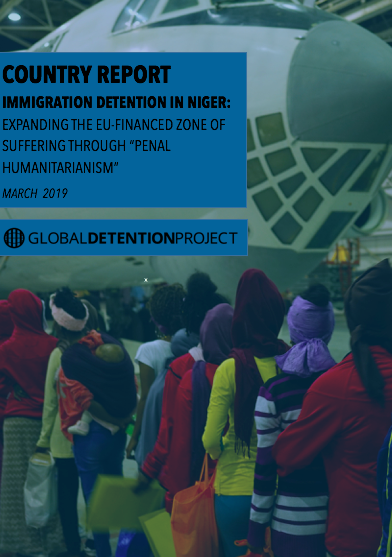Immigration Detention in Bulgaria (2019 Report): Although the number of irregular non-citizens apprehended in Bulgaria has plummeted in recent years, detention remains a key tool in the country’s response to migration and asylum flows. It has also spent some 85 million EUR to construct a fence along its border with Turkey. Bulgaria’s detention centres reportedly lack […]
Publications & Events
NEWSLETTER: April 2019
✅Shrinking space for independent monitoring in Croatia
✅Bulgaria’s reliance upon detention
✅The year in review – the GDP Annual Report
✅ Objective 21 of the Global Compact for Migration […]

NEWSLETTER: Immigration Detention Across the Globe – The GDP 2018 Annual Report
Last summer, people across the globe expressed outrage as U.S. immigration officials forcibly separated children from their parents at the U.S.-Mexico border. Overlooked in much of the criticism was the fact that children are detained for immigration reasons in dozens of countries across the globe, all of which—with the notable exception of the United States—have […]

GCM Indicators: Objective 21: Cooperate in Facilitating Safe and Dignified Return and Readmission, as well as Sustainable Reintegration
As part of the Refugee Law Initiative’s blog series exploring the implementation of the Global Compact for Migration (GCM), GDP Researcher Izabella Majcher addresses Objective 21 (“Cooperate in facilitating safe and dignified return and readmission, as well as sustainable reintegration.”) Majcher proposes focusing on six indicators, which draw from the provisions of binding international treaties, including the Convention against […]

Immigration Detention in Croatia: Shrinking Space for Independent Monitoring
Immigration Detention in Croatia (2019 Report): Traditionally a transit country for people attempting to reach Western Europe, Croatia took on new importance for refugees and migrants in late 2015 when the main migrant route shifted through the country. Since then, the government has grown increasingly security-focused, albeit while maintaining a humanitarian narrative. Non-citizens may be […]

Consultation of the UN Network on Migration with Civil Society
Consultation of the UN Network on Migration with Civil Society Geneva 4 April 2019 On 4 April, the GDP participated in the inaugural “Consultation of the UN Network on Migration with Civil Society.” The Network on Migration was established by the UN to assist Member States in implementing the Global Compact for Safe, Orderly and Regular […]

12th European Forum on the Rights of the Child
12th European Forum on the Rights of the Child: “Where We Are And Where We Want To Go” European Commission, Brussels 2-3 April 2019 GDP Executive Director Michael Flynn participated in the Annual EU Forum on the Rights of the Child held in Brussels on 2-3 April. The forum gathers key actors from EU Member […]

NEWSLETTER: March 2019
✅ Immigration detention in Niger, and the EU’s involvement in migration management within the country
✅ A look at how immigration detention is addressed in human rights law
✅ GDP on the record […]

Immigration Detention in Niger: Expanding the EU-Financed Zone of Suffering Through “Penal Humanitarianism”?
Immigration Detention in Niger (2019 Report): Niger has been a principal migration hub for people criss-crossing the Sahel region of Africa for generations. It has also served as an important transit country for migrants and asylum seekers on the Central Mediterranean route through Libya to Europe. More recently, the country has begun receiving third-country nationals who […]

Migrants’ Rights at a Crossroads
Migrants’ Rights at a Crossroads: Seizing the Moment(um) of the UN Global Compact on Migration and the SDGs 2030 to Forge a New Path for the Protection of Migrants’ Rights University of Leicester – Leicester Law School 22 March 2019 With the recent adoption of the UN Global Compact on Migration (GCM), and the integration […]




